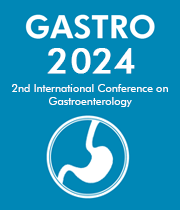Title : An immunohistochemical study for DNA mismatch repair deficiency in colorectal cancer in Sri Lanka: Preliminary findings
Abstract:
Colorectal Cancer(CRC) is the third most common cancer in men and the second most common in women throughout the world with an increase in the incidence and mortality, especially in rapidly transitioning countries. DNA mismatch repair deficient (dMMR) cancers account for around 15% of CRC, with 3% accounted for by hereditary Lynch Syndrome and the rest being of sporadic origin. Our study aims to identify the prevalence of MMR status in a Sri Lankan population and correlate the mismatch repair status (MMR) with the clinicopathological features. CRC patients are recruited from four selected tertiary care centers from Kandy and Colombo districts. The biopsy or colorectal cancer resection specimens are evaluated for the mismatch repair status using immunohistochemistry for the four MMR proteins, MLH1, MSH2, PMS2 and MSH6. Patient information are collected through hospital records and patient interviews. Of 60 cases evaluated, MMR deficiency (dMMR) was seen in 7 (11.66%) of the cases with most having loss of MLH1 and PMS2. Loss of MSH2 and MSH6 was observed in 2 cases and 1 case each was seen to have isolated loss of PMS2 and MSH6. Age less than 50 years (p=0.025), family history of colorectal cancer (p=0.002), mucinous histology (p=0.029), and maximum dimension ≥65 mm (p=0.036) were significantly associated with MMR deficiency. Of the seven identified dMMR cases, all presented at T stage 3 or 4 (100%), three cases with nodal involvement (42.9%), one with distant metastasis (14.3%), and six had perforations (85.7%). However, there was no significant difference in the proportion of high stage cancers between these and the MMR proficient cases. This stage of the study highlights the presence of dMMR cancers in our population (11.66%), and the associated factors. It also highlights that these are tumours presenting at advanced stages. The study in being continued to accrue a larger sample size to increase its validity.
Audience Take Away:
-
Identifying the proportion of colorectal cancer patients with DNA mismatch repair deficiency in the Sri Lankan population for the first time will provide data that can guide implementation of public health policies, screening programmes and allocation of resources for the more personalized treatment of colorectal cancer patients.
-
Comparison of the proportion of mismatch repair status in this South Asian population will benefit the understanding of the similarities and differences with other populations and contribute to a global understanding of the condition.
-
The identification of the mismatch repair status of this population will help us understand the molecular basis of colorectal cancer in this population which will have implications for personalized treatment and genetic counselling for affected individuals and family members.
-
Investigation of the clinical and histopathological features of mismatch repair deficient colorectal cancer will contribute to refining recommending criteria for patients that will need mismatch repair status identification which would be especially valuable in the low-resource setting.



